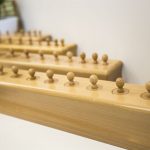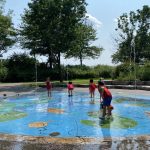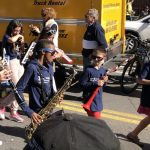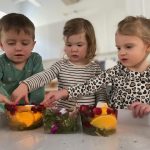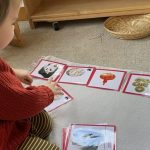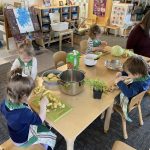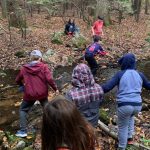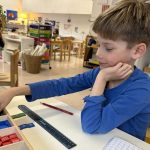Toddler Community
For children 18 months to 3 years
During the first 3 years of life, your child develops more rapidly than at any other time. During this phase, your child absorbs large amounts of information from the environment through observation and experiences. Our Toddler program supports children’s drive to do things independently, fostering self-confidence and a sense of competence.
As with all classrooms in CMS, the Toddler classroom is a specifically prepared environment that offers freedom through structure and order. The entire classroom is outfitted with toddler-sized furniture and work. Its shelves, chairs and countertops are appropriate for toddlers to use independently, which allows children to independently care for their personal needs and, in turn, cultivates their sense of achievement and a motivation to take on greater and greater responsibilities.
Our Montessori Toddler program offers a curriculum that emerges from each child’s unique skills and interests. Based on daily observations, our trained Montessori Toddler teachers introduce new materials and activities that ignite curiosity and stimulate learning. Learning at this age includes developing skills such as language, concentration, problem-solving, visual discrimination, and physical coordination. These are the years that lay the foundation for future learning.
Toddler Scheduling Options
Full Day Program Hours: approximately 8:30am – 3:00pm
Half Day Program Hours: approximately 8:30am – 11:45am
After-School Care: 3:15pm – 5:30pm
Weekly Schedule: 5 days a week, full or half day
School Year: August* – June
*At the beginning of the school year, new Toddlers are phased in over the first two weeks of school. Your child will be assigned a start date sometime in those first two weeks of school.
Additional Summer Programs are available for enrolled families.
Dr. Montessori declared that education from birth to 6 was the most important in a child’s life. “Children taking in knowledge now retain it for the rest of their life,” she asserted in her book The Absorbent Mind. She describes the importance and power of a child’s subconscious memory. “The impressions made there,” she explained, “remain engraved as characteristics of the individual.”
Toddler Curriculum
Each curriculum area of the Montessori classroom emphasizes specific skills, but there is dynamic interplay among the areas, enhancing children’s natural learning process.
Practical Life activities form the cornerstone of the Montessori classroom and prepare the child for all other areas. Practical life experiences, such as food preparation, flower arranging, and table washing have a purpose to care for one’s self and environment. Sharing stories, foods, and celebrations promote inclusion and a sense of community. Through grace and courtesy lessons, which empower their experiential learning, the children learn to serve snack, greet guests, offer things to others, and practice social customs. Toddlers are notorious walkers. They explore the natural world through their senses and are now at the height of their sensorial reception. The circle of family, caregivers, classmates, and teachers mutually informs and expands the meaning and reality of the community.
For children of this age, exposure to well-spoken language is key to developing the ability to communicate. Through conversation, manipulating objects and contact with others, children are exposed to new vocabulary and modes of expression. These experiences in a variety of activities, such as singing, rhyming, poetry, dramatic play, story readings, puppetry, art and language lessons stimulate toddlers to blossom into communicators. Engaging in personal interactions during daily routines and read-alouds results in the development of expressive and receptive language skills. New vocabulary is emphasized at every opportunity and helps the toddler in classifying, comparing, and discovering relationships with and between things.
We all learn through our senses, and this is especially true of very young children who are at the beginning of taking in and understanding the world around them. Sensorial activities assist Toddlers in the great task of organizing, integrating, learning about their sensory input while refining fine motor development and fostering concentration.
Toddlers engage in mathematical thinking by exploring with their senses and engaging in sequencing activities. Time is introduced through consistent everyday routines that highlight before, after, today, yesterday, and tomorrow. The experience of sorting and classifying leads to numeracy and establishing one-to-one correspondence. Math activities include stacking and nesting cubes, number blocks and puzzles, and sorting and counting materials.
The toddler is in a constant state of motion, purposeful and otherwise. The environment is designed to enable children to move freely and define their work space. All activities that support individual development are meant to be taken to the child’s chosen place of work. Independent of adults, toddlers negotiate chairs and tables and participate in a toileting routine. They are introduced to aerobics, obstacle courses, yoga, and improvisational dance. They manipulate balls, hoops, domes, springboards, mats, and balance beams. Through these activities, toddlers achieve great physical poise and a surprising level of independence.
Art is about process and exploration for toddlers. It is a visual language of marks that happen in three basic growth stages of drawing that are critical for creative development and in laying the groundwork for the muscle control needed to write.
The Toddler art curriculum offers experiential art activities that foster process over product and allow children the freedom of going through the crucial stages outlined above. Children are exposed to different mediums such as painting, printmaking, pottery, drawing, collage, and sculpture, along with a variety of tools to inspire sensorial and physical exploration. They learn about artists and artistic styles through hands-on exploration and interactive materials.
Toddlers music classes meet weekly for 30 minutes and support nurturing the love of singing, chanting, and moving to the beat and rhythm of the music. Classes provide the children with positive, joyful, and creative opportunities to experience musical subjects.
Spanish is introduced to Toddler students using songs, dance, books, images, activities, and simple games. Children begin to recognize simple vocabulary by listening. Through conversation only in Spanish, children explore familiar topics including counting, colors, animals, body parts, clothing, families, shapes, school, nature/weather, and food. Movement and manipulative materials play a key role in language acquisition at this level.
Toddlers participate in weekly library visits and story reading, perusal of books, and the experience of being read to in a large group. Children learn about print, how to care for books, and begin to identify fiction and nonfiction. They learn to read a picture, make inferences, recall favorite stories, and share information.
Children learn about our responsibility to the community at large and learn from their experiences with others. The entire school raises funds for Heifer International, with Toddler and Primary children hosting a bake sale, Elementary children participating in “Read to Feed,” and Middle School students selling crafts.

